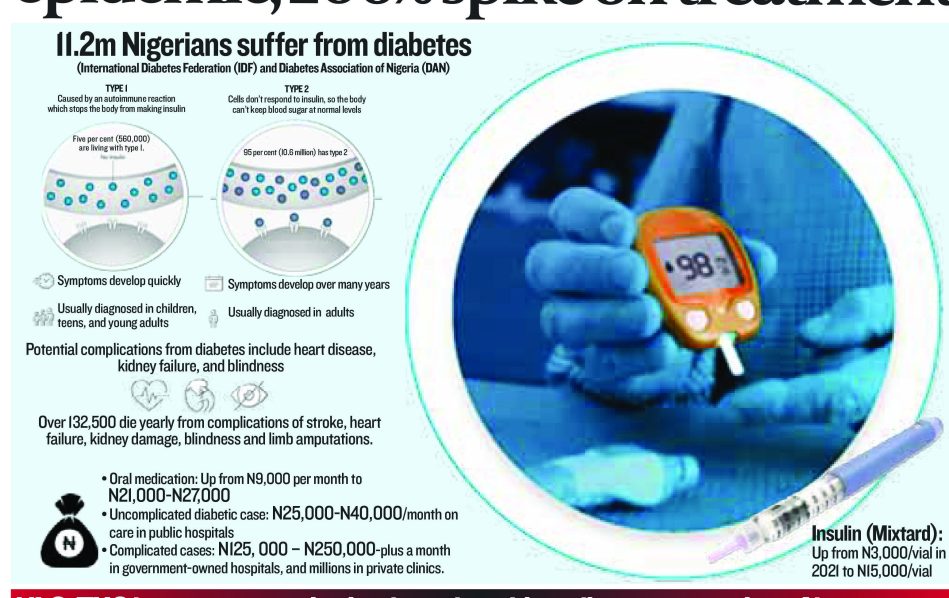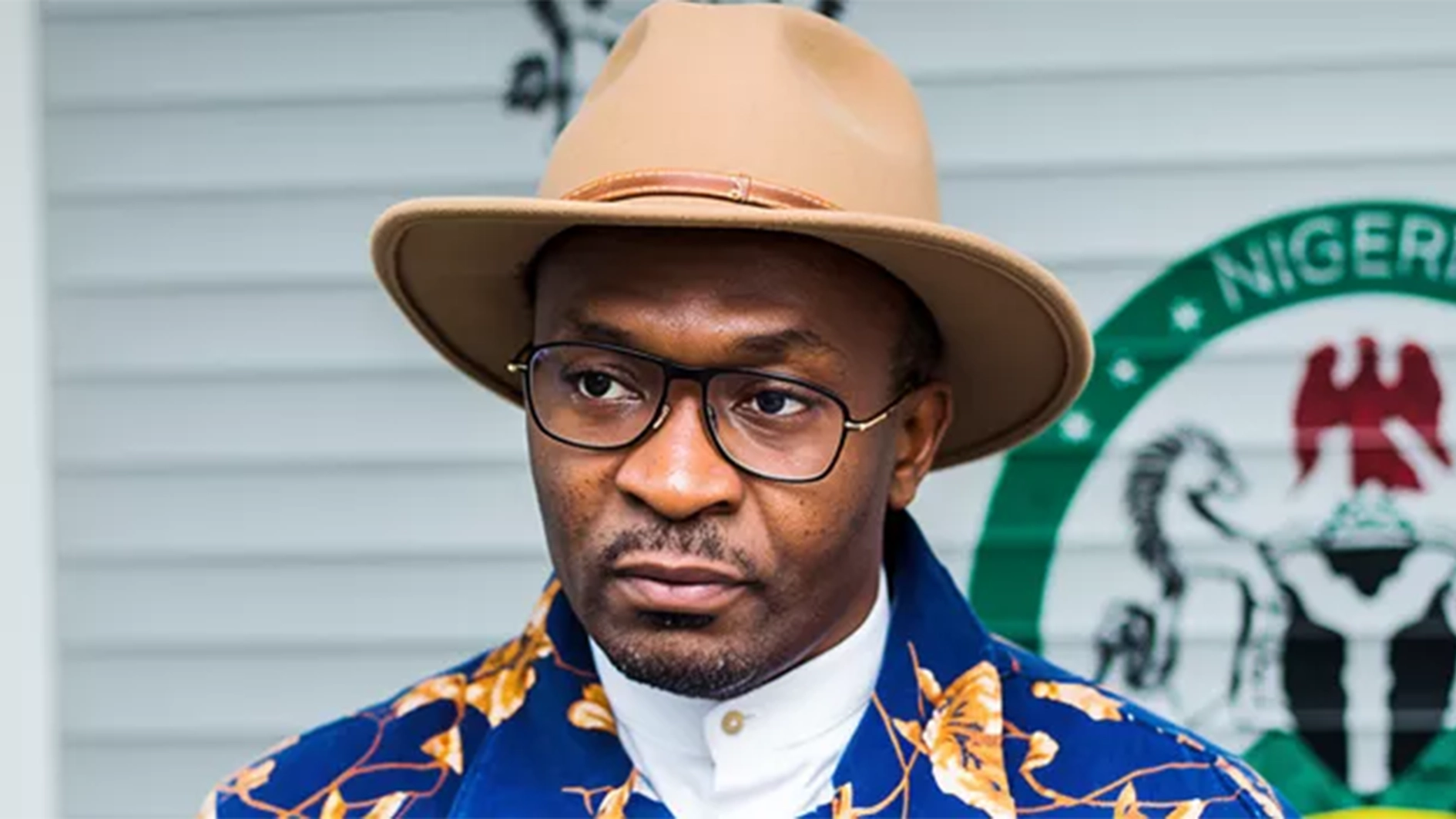
• Over 11.2 million Nigerians living with type 2 diabetes, 560,000 with type 1
• Patients lament increase in cost of insulin, drugs, tests, others
As the global community marks the World Diabetes Day (WDD) 2023 today, the high morbidity, mortality and soaring cost of treating the killer disease have continued to worry both patients and caregivers alike.
]ad]
By official records of the International Diabetes Federation (IDF) and Diabetes Association of Nigeria (DAN), no fewer than 11.2 million Nigerians are in various stages of diabetes ailment.
Among them, over 132,500 die yearly due to complications of stroke, heart failure, kidney damage, blindness and limb amputations.
Along with the epidemic proportion of the disease comes the heavy burden of treatment cost in a country where care is largely out-of-pocket.
Already, oral medications that used to cost N9,000 per month has climbed to between N21,000 and N27,000, depending on vendor. The cheapest insulin, Mixtard, which was N3,000 per vial two years ago, has spiked to N15,000 per vial. The insulin syringe, which used to be N30 two years ago is now N200.
The recommended diet regime of fruits and veggies that used to average N500 per day has also quadrupled – and much to the discomfort of the sick population and their dieticians.
Currently, a diabetic with an uncomplicated case would spend between N25,000 – N40,000 on care in public hospitals and a lot more in private settings. Complicated cases range between N125, 000 – N250,000-plus per month in government-owned hospitals, and millions in private clinics.
Practitioners, among who are endocrinologists, said that the alarming figures underscore the low fighting chances of the sick population, and a reason to intensify concerted efforts to slow the progression among the general public.
Statistics showed that of the 11.2 million Nigerians are in various stages of diabetes ailment, 95 per cent (10.6 million) has type 2, while only five per cent (560,000) are living with type 1.
President of DAN, Dr Mohammed Alkali, said the risk is high, given the high consumption of Sugar-Sweetened Beverages (SSBs), which include soft drinks, packet juices and energy drinks.
Alkali warned that they all increase the risk of non-communicable ailments like heart disease and type 2 diabetes by 20 per cent.
Speaking at an Art Exhibition, in commemoration of WDD, organised by the National Action on Sugar Reduction (NASR) in Abuja, yesterday, in Abuja, Alkali said Nigeria loses $4.5 billion (N4.5 trillion) to diabetes.
According to him, diabetes costs nearly N300,000 per patient in yearly health care cost, which worsens financial hardship for patients and their families and contributes to the loss of economic productivity.
A patient and a father of four, who has been diagnosed with type 2 diabetes since 2008, Bernard Enyia, said the cheapest insulin in the country, Mixtard, is now N15,000 per vial and he uses two vial per month.
“That is a very big burden for us. The insulin syringe, which used to be N30 two years ago is now N200 and oral medications that used to be N9,000 per month two years ago is now N21,000.
“My diet regime fruits and veggies recommended by my dietician is at the very least N500 per day, for a month I spent N15,000 or more. Blood sugar test in the public hospitals is N1,500 per test and higher in private hospitals and laboratories.
“Glucometers that used to be N6,000 four years ago now cost between N15,000 to N20,000 and the strips cost N12,000. My monthly medical checkup including transportation and consultations fee is now N19,000,” he lamented.
Consultant endocrinologist at College of Medicine University of Lagos (CMUL), Idi-Araba, Prof. Olufemi Fasanmade, said though the morbidity rate might not the be as high as figures show, he still warned Nigerians to be wary of sedentary lifestyle, alcohol consumption, excess use of soft drinks and fast foods.
]ad]
Fasanmade identified early detection and prevention of overweight and obesity as strategic in the diabetes control programme.
He warned that “diabetes can rarely be reversed by diet and lifestyle changes. Herbal medicine has no role as cure/adjunct treatment for diabetes. No herbal medication or orthodox drug has cured diabetes,” he said.
A Consultant Obstetrician and Gynaecologist and Medical Director, Optimal Specialist Hospital, Surulere, Lagos, Dr Celestine Chukwunenye, said the cost of treating type 1 diabetes was estimated to be N100,000 per annum in 2016 and would be much higher today considering the depreciation of the Naira.
“The average yearly direct medical cost of treating type 2 diabetes patients was estimated in the year 2020 to be about N250,000 with complications and N170,000 without complications. When diabetes complicates pregnancy, the costs are higher,” he said.
Chukwunenye added that the implications of spike in cases of diabetes include attendant increase in morbidity and mortality, a rise in financial costs, loss productivity, and man-hour of work.
He recommended improvement in primary health care services, early diagnosis, appropriate treatment, patient education, improved drug compliance, improving the standards of secondary and tertiary healthcare, improving access to care through a better organised and well-funded health insurance scheme, improving the socioeconomic status of the people and training of healthcare personnel.
The surgeon said further that as of now, there is no known cure for diabetes type 1 or type 2, conventional or herbal, though some studies have shown that increased, brisk physical activities and plant-based diet can reduce blood sugar levels in type 2 diabetes.
Chukwunenye said herbal remedies have a limited space in the management of type 2 diabetes but require more studies to standardise the preparations and improve the production process.
Communications Coordinator of Nigeria Health Watch, Thelma Thomas-Abeku, stated that World Diabetes Day provides a moment to reflect on commitment to promoting health, preventing diabetes, and supporting those living with the condition.
According to her, the event is impactful and serves as a powerful reminder of the collective efforts needed to raise awareness, foster understanding, and inspire positive change in the fight against diabetes and as part of the National Action on Sugar Reduction (NASR) coalition advocating for ending diabetes in Nigeria.
“Let us continue to work tirelessly, advocate passionately, and strive for a future where the exhibition of today becomes a testament to our shared success in ending diabetes,” she said.
]ad]






